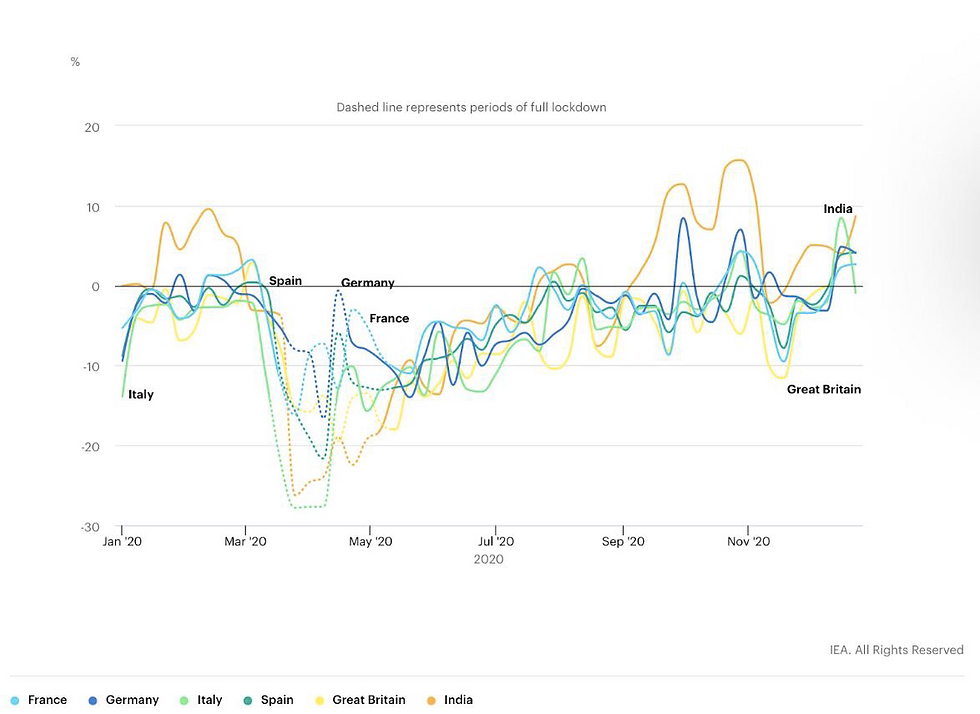The Energy Crisis in the UK: Who Turned Out the Lights?
- Leila Savant
- Oct 11, 2022
- 3 min read
Updated: Oct 12, 2022
For years we have taken the prices we pay for energy for granted. However, now that the UK’s supply has dropped, largely due to the sanctions applied towards Russia, our demand can no longer be met. This has caused the energy bills to skyrocket, leaving many households bracing for an inevitably cold winter.

Russia accounts for roughly 3% of the UK’s gas supply, in comparison to Europe as a whole, where Russia provides approximately 35% as its most prominent supplier. This has resulted in countries such as Germany to be forced to turn to coal burning as an unwelcome alternative to help bridge the energy gap. Previously, before the Russian invasion of Ukraine, 55% of Germany’s gas was sourced from Russia, yet now it not only has to rely on coal but seek other suppliers, such as to Norway or the Netherlands.
Although Germany has been facing a tumultuous period of time, the problems the UK are having to face are just as turbulent. Under Liz Truss and as a part of the Energy Price Guarantee, the energy price cap was reduced from £3,549 (which was going to be instated as of October 1st) to £2,500 annually. Despite the promise, this sum of money is still much higher than previous years; in 2021, according to the House of Commons Library, the annual energy price was £766. But how will Liz Truss facilitate this? According to her, the answer is simple: she will borrowing £100 billion for the energy bailout. Not quite so simple.
But why are the bills so high? What caused such a dramatic increase?
The main reason is the conflict in Ukraine. When Russia invaded Ukraine on the 24th of February this year, the UK responded to this by limiting its imports of Russian oil and gas. This decision to instate trade sanctions was reached as an act of solidarity and support for Ukraine and as an attempt to weaken Russia without causing any direct conflict. Individually, this may not have been enough to put a big dent in Russia’s economy, however, collectively more than 30 countries in the world also imposed sanctions, resulting in more than 1,000 foreign companies stopping their involvement in Russia. Despite this obvious fall in demand, Russia insists that things are running smoothly. Nonetheless, Secretary of State Antony Blinken is sceptical, stating that, ‘Moscow is cherry-picking economic data’, suggesting Putin is manipulating data in order to present a strong front, meet his own ends and ensure support from both influential companies and citizens by convincing them the war has limited negative consequences.
Whilst all evidence suggests that this is the primary reason for the increased energy prices, the world’s recent emergence out of the COVID-19 pandemic also led to a surge in demand for energy and therefore, is not inconsequential in contributing to our current energy crisis. More people have a higher disposable income, are taking cars and public transport to get to work, causing consumption as a whole to rise dramatically. During the first half of the pandemic, the spending of households dropped by 22.2% but in recent months the UK has recovered by 19.6% and it is clearly reflected in the energy gap.

Chart showing the weekly electricity demand year on year; yellow line= UK in 2020
So what does this mean for the general public? How will people of the lower taxing brackets manage?
A recent study by the Guardian suggests that the UK will be the most severely affected out of all other Western European countries, with spending on energy projected to be reduced by 8.3%. One in three households has said they will be reducing their heat use this winter in hopes of lowering their costs.
It is important to note, however, that the government will be aiding low income households who already receive specific benefits or tax credits in the sum of £650 over the course of the year. Similarly, pensioners are going to be given £300 in aid for the rising costs. There are also various organisations such as the Household Support Fund and the Warm Home Discount Scheme that will work to further aid those families in need.
Sources:






Comments